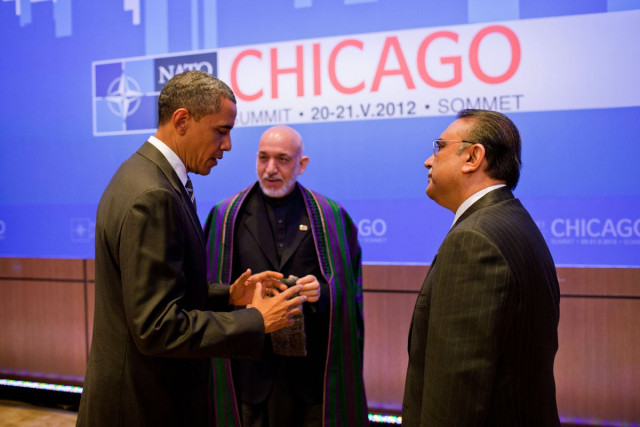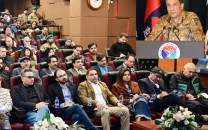Pakistan’s ‘restraint’ at Chicago
Pakistan recoiled to the position that the Nato supply route will reopen only after the US has apologised.

President Asif Ali Zardari did not make a speech that could have earned him a standing ovation from the 60 heads of state. He was, perhaps, partially looking over his shoulder to Pakistan where the establishment is scared of the reaction that such a ‘capitulation’ will bring in its wake. Contrary to his endlessly supple approach to crises, he made reference to ‘respect’ as a sop to the rough public opinion inside Pakistan. But his real message was packed in what he said next: “The cabinet’s Defence Committee has decided to direct the relevant officials to conclude negotiations for resumption of the Ground Lines of Communication (GLOCS) needed to supply foreign troops in Afghanistan”.
The media back home has focused on the ‘snub’ that President Zardari received from US President Barack Obama for not giving in, ignoring that both presidents were going through a pantomime dictated by domestic politics. When the GLOCS are discussed in the coming days, Pakistan will apply all kinds of formulas to address its real concerns: reformulate the modalities of ‘apology’ and ‘drones’ and get a better deal from the Nato route which may have become a ‘once only’ option to counter the more expensive alternative ‘northern route’ that will isolate Pakistan even more.
No one should ignore that President Zardari also said “the foreign fighters and non-state actors seeking to destabilise Afghanistan and the region, if found on our soil, must be expelled”. He was recalling words used by Pakistan’s parliament while laying down the ground rules for the country’s foreign policy. What is remarkable is that he also explained in his speech why Pakistan was unable to remove the safe havens in North Waziristan which the world has been perceiving as Pakistan military’s plot to cause discomfiture to Nato in Afghanistan: “[Pakistan] would require the support of the international community, both in terms of resources and capacity-building. It will also require measures aimed at the economic well-being of the people of the areas affected by the military action”.
Nato Secretary-General Anders Fogh Rasmussen was clearly understanding when he said: “We did not anticipate an agreement on the Pakistan transit routes to be reached at this summit. That was not planned”. The summit declaration pointed to future progress on the matter of routes. It said: “The alliance expressed appreciation to Russia and Central Asian governments for allowing supply convoys through their territory while Nato continues to work with Pakistan to reopen the ground lines of communication as soon as possible.”
There are many reasons why Pakistan has been restrained at the Chicago Nato summit about the reopening of the Nato supply route but one powerful reason is the Defence of Pakistan Council (DPC) led by religious leaders and elements known as non-state actors. What is more dangerous is that the political parties opposed to the ruling coalition have lined up behind the DPC and are threatening their own protests, perhaps secretly appreciating the possibility that al Qaeda and the Taliban will oblige by attacking the supply route with suicide bombers.
Pakistan must come out of its internal contradictions perpetuated by terrorism and the compulsion of the national media of presenting a one-sided xenophobic picture for fear of getting their reporters killed. The world is puzzled by the behaviour of the government and military of Pakistan, falsely bitter towards the world and pusillanimous towards the elements that rob the state of its internal sovereignty.
Published in The Express Tribune, May 23rd, 2012.















COMMENTS
Comments are moderated and generally will be posted if they are on-topic and not abusive.
For more information, please see our Comments FAQ